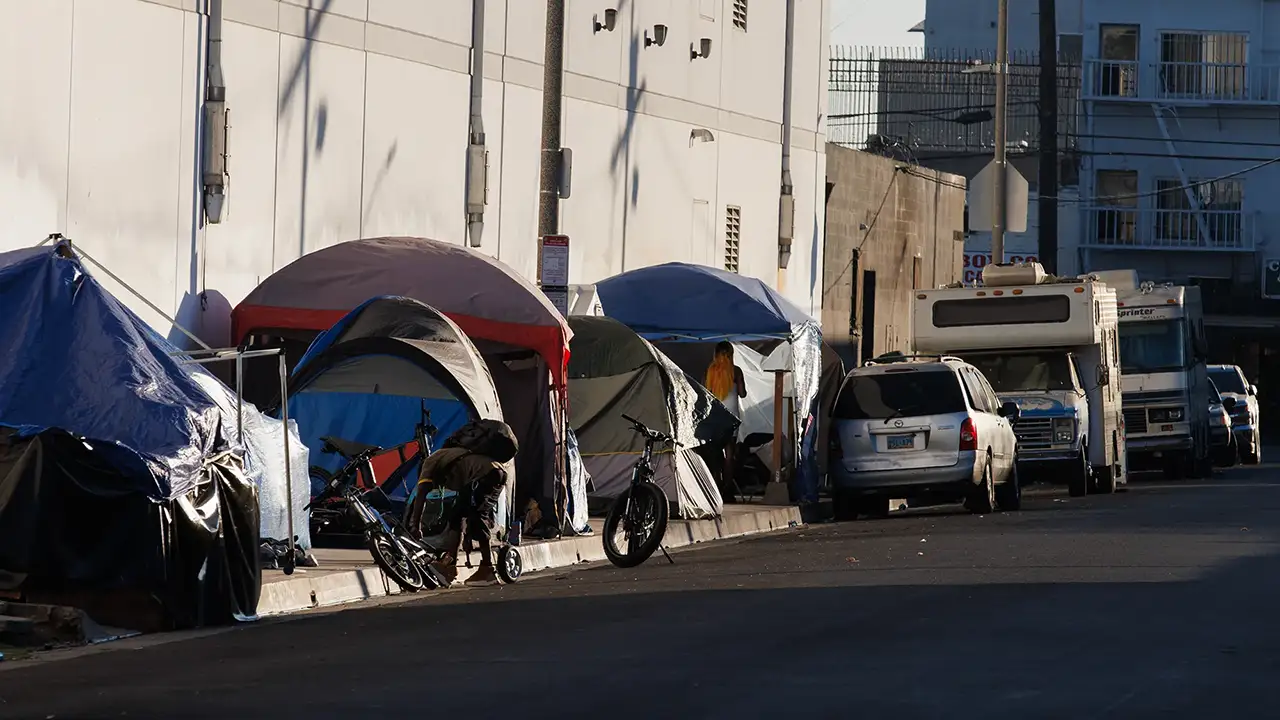The ongoing dispute between Los Angeles city and county over homelessness highlights systemic issues in California's local governance. (CalMatters/Carlin Stiehl)

- California's historical county formation led to complex, often conflicting roles with cities.
- Los Angeles County supervisors voted to withdraw from a joint homelessness agency, escalating tensions with the city.
- A lack of statewide reform means friction between California cities and counties over shared responsibilities will persist.
Share
This commentary was originally published by CalMatters. Sign up for their newsletters.
When California became a state in 1850, it had fewer than 100,000 residents and 27 sparsely populated counties. Several were larger in land area than some states.
However, its population was exploding with Gold Rush immigrants and almost immediately they began pressing the Legislature to create new counties so they could more easily access services such as filing mining claims.
Over the next 57 years, 27 counties became 58 counties — one of which, Glenn County, was carved out of Colusa County in 1891 and named for my cousin, Hugh Glenn, the state’s largest farmer until his murder in 1883. All or parts of 12 new counties were formed by dividing up immense Mariposa County. The 58th, Imperial, was formed in 1907 from the eastern portion of San Diego County.
During the late 19th century and well into the 20th, California counties had a few relatively simple functions, such as rural law enforcement, road maintenance and maintaining property records. However, during the latter part of the 20th century, federal and state governments created an array of health and welfare programs and California opted to have counties manage them, rather than the state itself or cities, as some other states did.
Counties’ Evolving Roles
Counties became bifurcated as both agents of the state and providers of local services, and those roles were often in conflict because the former was inescapably mandated while the latter was more important to local voters and taxpayers.
The creation of more than 400 incorporated cities in the 1900s also complicated local governance. Cities diverted streams of property and sales tax revenues from counties and also tended to have concentrations of social ills — poverty, crime, drug addiction and homelessness — that county-managed health and welfare programs were supposed to address.
Thus, California’s counties and cities, particularly in highly urbanized regions, have often evolved into adversaries rather than partners in dealing with issues of high public and media visibility.
What happened last week in California’s most populous county and its largest city, both named Los Angeles, exemplifies the intergovernmental tensions. The catalyst, of course, is homelessness, which sits atop Californians’ list of issues.
LA City vs. County Feud
Read More: With Measure A, Los Angeles voters embrace a bigger response to homelessness
The state has spent more than $20 billion in recent years to deal with homelessness but the ranks of the unhoused have continued to climb and now approach 200,000, by far the largest population of any state both quantitatively and relatively. Gov. Gavin Newsom regularly accuses local governments of dragging their feet on creating effective programs to deal with it.
In Los Angeles, city and county officials have squabbled for decades over responsibility, and in the 1980s the city even sued the county. Thirty-two years ago, they agreed to form a joint agency, the Los Angeles Homeless Services Authority, but the infighting never stopped. In recent years, it has become more intense.
For the last five years, federal Judge David O. Carter has presided over a lawsuit filed by the LA Alliance for Human Rights, demanding to know how the authority has spent homelessness funds. Carter has excoriated the agency for a lack of action and a lack of transparency, and it has also gone through two scathing audits.
Last week, the five-member Los Angeles County Board of Supervisors voted to pull out of the joint agency and create its own department to deal with homelessness, spurning pleas from city officials, including Mayor Karen Bass. City and county officials are also squaring off over newly amended legislation, Senate Bill 16, that would require counties to provide more money to cities for homeless shelters.
Statewide Reform Needed
Homelessness is just one of the many issues that poison relations between city and county officials. The rational response would be a statewide reconfiguration of the responsibilities that recognizes 21st-century realities and reduces the friction.
It’s not likely to happen, so the rivalry will continue to fester.
This article was originally published on CalMatters and was republished under the Creative Commons Attribution-NonCommercial-NoDerivatives license.
Make Your Voice Heard
GV Wire encourages vigorous debate from people and organizations on local, state, and national issues. Submit your op-ed to bmcewen@gvwire.com for consideration.
RELATED TOPICS:
Categories





















